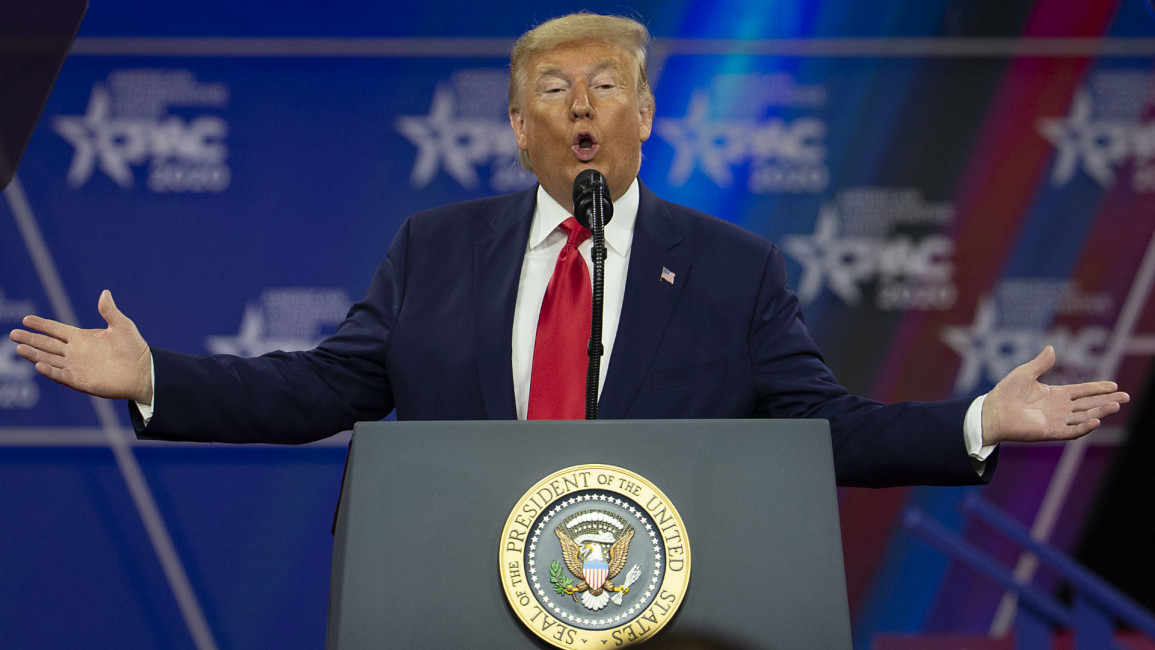Trump tests negative for coronavirus as US expands Europe travel ban amid national emergency
President Donald Trump has tested negative for the novel coronavirus, his physician said, following concerns over his exposure to a disease that has paralysed the globe.
Trump agreed to the test after coming in contact with several members of a Brazilian presidential delegation visiting his Florida resort who have since tested positive for the virus.
"This evening I received confirmation that the test is negative," the president's physician Sean Conley said in a Saturday memo.
Trump, 73, had dismissed concerns over his exposure to the disease which has killed at least 51 Americans and upended the rhythm of daily life across the country, with millions working from home and schools shut.
New York, the most populous US city, saw its first coronavirus death on Saturday, as store shelves were stripped bare after days of panic buying.
Read also: WATCH: Saudi authorities break up wedding party amid virus fears
Across the Hudson River in Teaneck, New Jersey, Mayor Mohammed Hameeduddin called for a citywide self-quarantine after 18 cases were confirmed in the township.
"What we are saying is that we are ground zero," Hameeduddin said. "Expect or act as though you're going to infect somebody or somebody is going to infect you."
Vice President Mike Pence announced further curbs on travel to the United States, saying a ban imposed on European nations over the pandemic would be extended to the United Kingdom and Ireland on Tuesday.
The restrictions threw airports across the country into disarray, with incoming travelers forced to wait hours for medical screenings before passing through customs.
Illinois governor JB Pritzker said the long lines at Chicago's O'Hare airport were "unacceptable."
"The federal government needs to get its s@#t together. NOW," he tweeted.
Acting Homeland Security secretary Chad Wolf said his office was working with airlines to improve screening times.
Trump advised against non-essential travel and said officials were also considering imposing domestic restrictions.
"If you don't have to travel, I wouldn't do it," Trump said at a White House news conference. "We want this thing to end."
In an official proclamation, he also named Sunday a national day of prayer "for all people who have been affected by the coronavirus pandemic."
Trump declared a national emergency on Friday, freeing up some $40 billion in disaster relief funds.
The US House of Representatives also passed a bill - crafted by Democrats in consultation with the Trump administration - to provide billions of dollars for free virus testing, emergency paid sick leave and family leave. It is expected to pass the Republican-majority Senate.
A broader travel ban
On Saturday a 30-day US ban took effect on all travel from the EU's Schengen border-free zone, part of a global clampdown on travel to curtail the virus.
Pence said the ban would include Britain and Ireland as of midnight EST on Monday (0400 GMT on Tuesday). Both countries had been excluded from the initial ban.
"Americans in the UK or Ireland can come home. Legal (US) residents can come home," Pence said.
Trump also aimed a new jab at the US Federal Reserve, saying he wanted it to be "much more proactive" in moving to protect Americans from the widespread economic dislocation caused by the pandemic.
The COVID-19 virus, which was first detected in China's Wuhan in December, has killed more than 5,845 people worldwide, while over 157,000 infections have been confirmed.
Agencies contributed to this report.
Follow us on Facebook, Twitter and Instagram to stay connected



